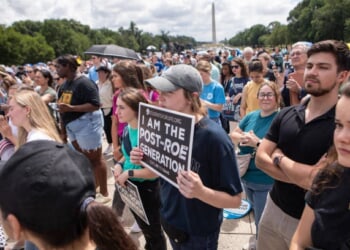Miriam Cates is the former MP for Penistone and Stocksbridge.
Early indications suggest that new online age verification regulations are having the desired effect, reducing the number of children who accidentally encounter pornography on the internet. Traffic to the UK’s most popular adult sites has decreased by an impressive 47 per cent since the child protection requirements of the Online Safety Act 2023 (OSA) finally came into force last month.
Despite widely reported concerns about privacy and ‘censorship’, polling shows that 69 per cent of Britons support age verification.
In contrast to the views of the great British public, some commentators on the online right have expressed outrage at the new regulations. It is right to be concerned about the unintended consequences of legislation. But instead of taking seriously the threat posed to our children by extreme and violent pornography, many on the right seem to have suspended their conservative instincts and are in danger of dancing to the libertarian tune of Big Tech and Big Porn.
I am just as concerned about censorship and free speech as anyone else. In the last parliament I championed the higher education Freedom of Speech Bill and was one of the few MPs to oppose lockdowns. But the primary purpose of online age verification is to protect children from pornography, and pornography is not free speech.
Some conservatives seem to be under the impression that there is something fundamentally ‘British’ about unfettered ‘freedom of expression’, but nothing could be further from the truth. Britain has a long history of robust obscenity laws, and the distribution of hardcore pornography was completely illegal until the late 20th Century. Far from being some libertarian Wild West, this country has a proud tradition of prohibiting the distribution of violent, obscene and sexually explicit material.
When it comes to introducing new regulations, of course conservatives should be suspicious of the motives of the government. But we should be equally cynical about the motives of powerful and wealthy industries in opposing that regulation.
When the new age verification rules came into force on 25 July, X began to restrict certain posts, stating that “due to local laws we are temporarily restricting access to this content until X estimates your age”. Some X users saw this as ‘proof’ that the OSA was a censor’s charter.
Being asked to prove your age is not censorship, just as having to present ID to buy alcohol is not prohibition. Yet this was the argument made when a House of Commons speech relating to the Pakistani rape gangs was suddenly unavailable to view on X without proof of age.
The speech in question, made by the excellent Shadow Home Office Minister Katie Lam MP, was a brave and hugely important contribution to the debate. But brilliant as it was, the speech is sexually explicit and clearly unsuitable for children. In her intervention, Lam quoted the remarks of Judge Peter Rook at the sentencing of Mohammed Karrar of Oxford to life in prison, telling MPs how Karrar:
“…prepared her” – that is his victim, a 13-year-old girl – “for gang anal rape by using a pump to expand her anal passage. You subjected her to gang rape by five or six men. At one point she had four men inside her. A red ball was placed in her mouth to keep her quiet… When she was 12, after raping her, she threatened you with your lock knife. Your reaction was to pick up a baseball bat with a silver metal handle, strike her on the head with it, and then insert the baseball bat inside her vagina.”
The official age requirement for opening an account on X is just 13 years old, and younger children can easily access the platform. There is nothing to be gained, and plenty to be lost, by allowing children to hear these words. For broadcast TV we have a watershed, and cinemas use age ratings to prevent children from encountering violent and traumatising sexual material. Why should these rules not be upheld online?
Interestingly, while X chose to restrict Lam’s speech, Youtube and Facebook did not, despite these platforms being placed in the same category of provider under the OSA. X had just as much notice of the new regulations as the other platforms; yet, astonishingly, the solution of Elon Musk’s platform to the OSA’s age verification requirements remains ‘tbc’. When users visit the X help centre to find out how to verify their age, they are informed that:
‘X is planning to give users a choice between two secure, privacy-respecting options: Facial age estimation…[or]…ID verification:… These measures should be made available in the following weeks. We will update this page in due course.’
It is implausible that, unlike other platforms, X has been unable to find a sensible way to roll-out age verification in time for the deadline. The assumption must therefore be that X has chosen not to do so, perhaps botching the implementation in such a way as to undermine political support for the principle of age verification. A cynic might suspect that X bosses deliberately picked issues that they know to be of paramount importance to their ‘base’ on the online right – grooming gangs and immigration – and targeted that content for restrictions.
If that was X’s intention, it was astonishingly successful, triggering a wave of online outrage, false claims about the actual regulations, and a plethora of hysterical posts about how the internet is apparently being ‘shut down’. Commentators found themselves defending social media companies (specifically X) as the guardians of free speech.
But Big Tech is only interested in free speech as far as it can be monetised. X is not Hyde Park Corner; it is a business whose product is you and me, profiting from capturing and selling our attention to advertisers.
British conservatives are painfully aware of the way that massive levels of immigration have disrupted and weakened Britain culture. But the internet and social media have triggered equally seismic cultural disruption, especially for the young.
The most significant destructive force unleashed by the internet – and the most compelling reason for online age verification – is online pornography. In just a few short years, porn has gone from the margins to the mainstream. Before July, Pornhu (just one of many adult sites) had three million daily UK visits; around half of British adults consume online pornography.
The sexual activity depicted in internet porn is shockingly degrading to women, propagating the idea that women’s bodies exist only for men’s pleasure and that male violence is normal and desirable. It is illegal to treat animals in the way that many women (and children) are treated in online pornography.
Yet we have allowed it to proliferate; worse than that, we have not even tried to prevent young children from encountering real images of women and girls being raped, strangled, slapped, spat on, and tortured. The average age of first viewing is just 11 years old. By the age of 18, 70 per cent of British teenagers have viewed violent pornography.
Porn is having a devastating effect on the emerging generation. For the first time, more than half of child sexual abuse and exploitation offences are committed by other children; over one third of young women report being strangled during sex compared to just three per cent of older women; two thirds of young women believe young men are ‘pretty frightening’; incidences of aanal injuries in females are on the rise.
It is difficult to claim that ‘gender equality’ is a core British value when we turn a blind eye to the fact that collectively our citizens spend millions of hours a week masturbating to videos of women and girls being violently assaulted.
Conservatives have rightly focused on the consequences for women and girls of immigration from countries with misogynistic cultures. But we have ignored the consequences of the pornification of our own culture. More than 850 men in the UK are now arrested each month for possession of child sex abuse material, as online porn algorithms feed users more and more extreme, and eventually illegal, content.
Pornography is not freedom. It undermines the foundation of our peaceful, free and prosperous society, namely a fair settlement between the two sexes.
This predominantly voluntary understanding between men and women, where men are socialised to respect and protect women and children even though they can choose not to, stems from Britain’s religious heritage, specifically the Christian teaching that women – though physically weaker than men – are equally human and must be equally valued. This doctrine underpins the respect for individual freedoms and dignity that we commonly identify as ‘British values’.
Online porn threatens to destroy much of what has made British society ‘free’, especially for women and children. Big Porn is big business; the industry is thought to be worth around $100bn per year.
And porn is the reason, I suspect, why X is so determined to undermine new age verification regulations. Unlike Youtube and Facebook, X is awash with sexual content and it is Musk’s platform – not dedicated adult sites – where British children are most likely to first encounter pornography. For all the teething problems with its implementation, age verification is a vital first step in a very British fightback against normalised obscenity and the sexual exploitation of women and children.
Of course we should be concerned about censorship. But attempts by the state, the police and Big Tech to monitor and censor online content began well before the Online Safety Act, and they will no doubt continue independently of the Act’s provisions.
Right-wingers should not conflate the authoritarian instincts of some of our institutions with genuine and necessary attempts to protect children from the horrors of online pornography. Reclaiming our great British tradition of decency and dignity for all should be the goal of all conservatives – and it will be popular with the public too.









![Florida Man With Violent History Arrested for Choking a Cop [WATCH]](https://www.right2024.com/wp-content/uploads/2025/06/Eleven-Stabbed-in-Attack-at-Salem-Homeless-Shelter-Across-From-350x250.jpg)







